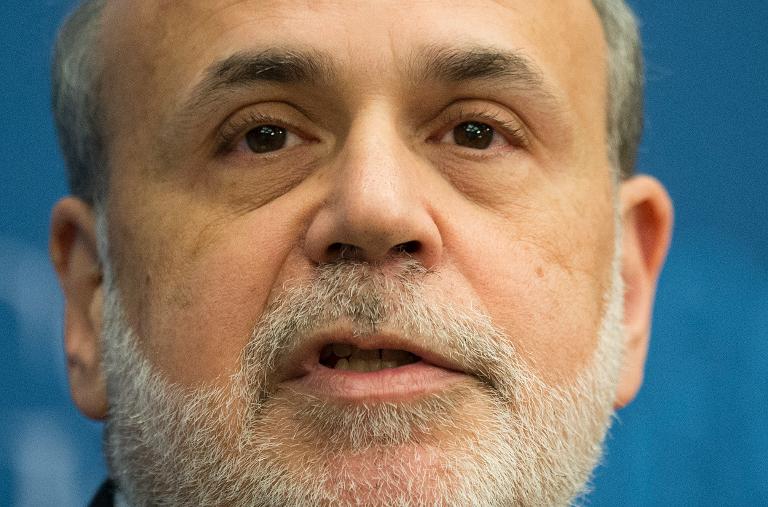
Fed poised for another taper of big stimulus
(MENAFN- AFP) The Federal Reserve opened its last policy meeting chaired by Ben Bernanke on Tuesday, with another stimulus cut by the US central bank widely expected.Bernanke, whose eight-year tenure as Fed chairman has included the deepest US economic and financial crisis since the 1930s, is stepping down Friday after putting in motion the wind-down of the central banks' unprecedented stimulus program.The taper of the Fed's asset-purchase program, which aimed at tamping down interest rates to support economic growth, charts new territory in central bank policy, and the Fed has signaled it will proceed cautiously to avoid undermining recovery from the Great Recession.The Fed took the first step in December, deciding to cut the $85 billion a month operation by $10 billion, and most economists expect it to cut another $10 billion in this week's meeting.The two-day Federal Open Market Committee (FOMC) meeting that concludes Wednesday comes amid strains in emerging-market currencies, in part due to the Fed's stimulus cuts, which are pushing up interest rates. To fight an outflow of funds pressing its currency down, in India the central bank surprised with a quarter-point rate hike to 8.0 percent, and in Turkey the central bank signaled it would hike rates at a late-night crisis meeting.But those emerging-market woes appeared unlikely to sway the Fed from further tapering. The moves in India and Turkey helped firm up emerging-market and advanced-economy stock exchanges Tuesday, "which in turn should take any pressure not to taper off the Fed," said Chris Low of FTN Financial. For the Fed, no rate increase is on the horizon for this year. Having kept the key federal funds rate near zero for five years, the majority of FOMC members predict conditions may be ripe for monetary tightening only in 2015, when the US unemployment rate is projected to fall firmly below their 6.5 percent threshold.With its rate at the lowest possible, the Fed under Bernanke plunged ahead with a series of asset purchases, to press down long-term market interest rates and stimulate investment.Now the central bank holds trillions of dollars in debt and mortgage-backed securities, swelling its balance sheet to more than $4 trillion and raising concerns within the Fed and elsewhere about the risks to financial stability.After months of hinting, finally the FOMC decided to make its first cut to the quantitative easing program (QE) at its December 18 meeting.A similar cut, if decided this week as expected, would bring the level to $65 billion, and if the taper continues at that pace, the Fed will have concluded QE after the late-October FOMC meeting.Bernanke earlier in January said the Fed was well-prepared to handle any risks from its stimulus, such as higher inflation and asset bubbles."We don't think that financial stability concerns should, at this point, detract from the need for monetary policy accommodation, which we are continuing to provide," he said at a forum at the Brookings Institution.Supporting the withdrawal of stimulus is the improvement in the US economy, including a rebounding housing market, a jobless rate that fell to 6.7 percent in December, and inflation still well below the Fed's 2.0 percent target.But manufacturing and service sector activity has slowed and retail sales in the important holiday shopping month of December rose a mere 0.2 percent from November, suggesting there is still weakness in the economy."Overall the US economy continues to improve and the decision to begin tapering last month was carefully calculated," said Kathy Lien of BK Asset Management."Therefore the Fed is expected to overlook last month's softer economic reports and forge forward with reducing asset purchases." As for the FOMC's longer-term strategy under Janet Yellen, the current vice chair who will take the helm on February 1, not much change is expected from the policy of her long-time ally Bernanke.Yellen, who will become the first woman to chair the Fed, has said -- as Bernanke has repeatedly done -- that the stimulus tapering will be "data-driven" and the bond purchases "have made a meaningful contribution" in helping the economy.

Legal Disclaimer:
MENAFN provides the
information “as is” without warranty of any kind. We do not accept
any responsibility or liability for the accuracy, content, images,
videos, licenses, completeness, legality, or reliability of the information
contained in this article. If you have any complaints or copyright
issues related to this article, kindly contact the provider above.


















Comments
No comment